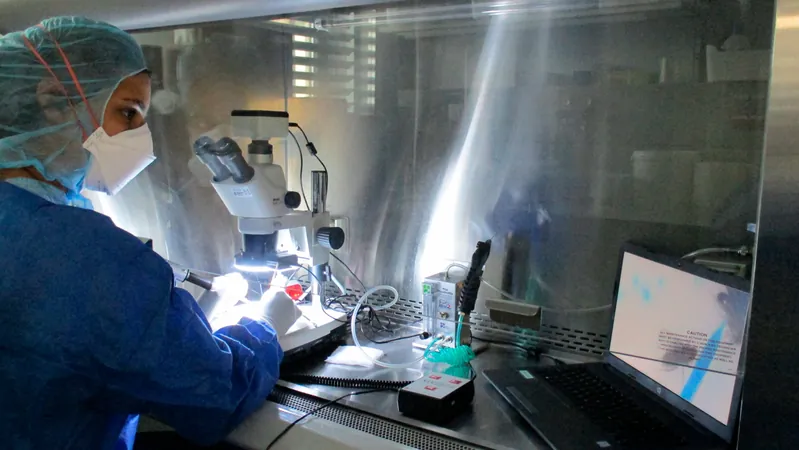
Breakthrough in Drug Testing: New Fly Model Revolutionizes Infection Research!
2024-11-15
Author: Yu
Groundbreaking Study
A groundbreaking study led by researchers at the Germans Trias i Pujol Research Institute and Hospital has unveiled a new infection model using Drosophila melanogaster—the humble fruit fly—that could transform the landscape of drug testing for infectious diseases.
Benefits of Using Drosophila
The Clinical and Experimental Microbiology Unit (UMCiE), in collaboration with the Comparative Medicine and Bioimage Centre of Catalonia (CMCiB), has dedicated years to perfecting infection techniques in these tiny organisms. With a remarkably short life cycle and low maintenance costs, Drosophila offers numerous experimental advantages. Approximately 65% of their genes are homologous to those in humans, making them an ideal choice for studies aimed at understanding diseases that affect humans. Moreover, employing Drosophila could significantly reduce the need for vertebrate animals in preliminary research, providing a more ethical approach to scientific inquiry.
Research Applications
UMCiE researchers have begun utilizing this experimental model to assess the efficacy of new vaccines and antibiotics after verifying their performance in laboratory settings. Recent publications in *Frontiers in Microbiology* and *Frontiers in Immunology* outline the promising potential of this model in various infection scenarios, particularly its innate immune responses against *Candida albicans*, a notorious pathogen known to challenge immunocompromised individuals.
Study Findings
The article published in *Frontiers in Microbiology* discusses the establishment of the infection model, detailing a comprehensive review of relevant studies and the expertise of the research group. It outlines the methodologies for infection and drug administration, paving the way for future tests on antibiotic candidates with unprecedented speed and cost-effectiveness.
Insights into Immune Response
In their parallel study, researchers investigated how the Drosophila model responds to *Candida albicans* infections, revealing intriguing insights into immune responses. Enhanced immune reactions can impede fungal growth; however, this pre-immunization strategy does not inherently shield the flies from mortality due to a dangerous immune overreaction, akin to the cytokine storm observed in severe COVID-19 cases. These revelations highlight a dual focus on not only eliminating pathogens but also moderating harmful immune responses through innovative therapeutic approaches, termed "host-directed therapies." Strategies could include the use of anti-inflammatory medications or corticosteroids, emphasizing a more balanced treatment approach.
Expert Commentary
Pere-Joan Cardona, head of UMCiE and Microbiology at Germans Trias i Pujol University Hospital, expressed enthusiasm for the research team's achievements: "These publications signal a major milestone for our group in using the Drosophila infection model. We now have a platform to efficiently and effectively evaluate candidates against infectious agents—be they antibiotics or immunomodulatory drugs. This is a significant step forward in our mission to reduce the need for animal testing and solidifies our position as a leading institution in this research arena."
Future Implications
As the scientific community demands more ethical and rapid methods for drug testing, this innovative approach using Drosophila flies could pave the way for new treatments—transforming how we combat infectious diseases while minimizing reliance on traditional animal models. Is this the future of drug testing? Only time will tell, but the potential is promising!



 Brasil (PT)
Brasil (PT)
 Canada (EN)
Canada (EN)
 Chile (ES)
Chile (ES)
 España (ES)
España (ES)
 France (FR)
France (FR)
 Hong Kong (EN)
Hong Kong (EN)
 Italia (IT)
Italia (IT)
 日本 (JA)
日本 (JA)
 Magyarország (HU)
Magyarország (HU)
 Norge (NO)
Norge (NO)
 Polska (PL)
Polska (PL)
 Schweiz (DE)
Schweiz (DE)
 Singapore (EN)
Singapore (EN)
 Sverige (SV)
Sverige (SV)
 Suomi (FI)
Suomi (FI)
 Türkiye (TR)
Türkiye (TR)